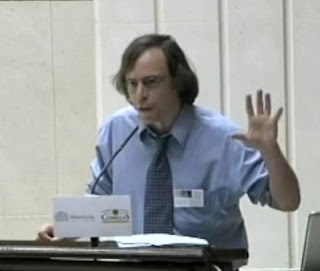Spinoza weer terug op de kaart vanwege "the religious or theological 'turn'"?
U weet wel: naar analogie van de door Rorty zo getypeerde "linguistic turn" is de sinds enige jaren op alle fronten weer teruggekeerde belangstelling voor godsdienst en theologie - in de praktijk en in de wetenschap - te typeren als een godsdienstige of theologische wending. Soms krijg je zelfs het gevoel dat we weer helemaal terug zijn in de 17e eeuw. Als iemand vraagt: "waarom bezig zijn met Spinoza?" ligt hier één van de antwoorden.
Ik begin met een voetnoot uit de inleiding van een boek dat ik in dit blog ga signaleren, welke die indruk versterkt:[Voetnoot 27] “The attitude in Radical Orthodox circles to Spinoza is symptomatic. Conor Cunningham’s dismissal of Spinoza reads like the worst sort of eighteenth-century heresy-hunting, claiming perversely and hyperbolically, “In the world of Spinoza there can be no difference between a Holocaust and an ice cream.” (Conor Cunningham, Genealogy of Nihilism: Philosophies of Nothing and the Difference of Theology (London: Routledge, 2002), 68) Just like Blond*, Cunningham attempts to bring about a return to the religious through inspiring fear and superstition in his readers. We should, it is implied, run screaming into the arms of the Church on encountering this nihilistic spectre. Apparently, this theology does not know the difference between scholarship and assertion, blindly referencing Spinoza scholars like Yovel and Deleuze out of context to support his own peculiar reading. For example, he claims Spinoza was trying to trick his readers by hiding behind Scholastic concepts and, as evidence for this view, quotes Deleuze: “It is for this reason that Deleuze says that ‘the Ethics is a book written twice simultaneously’.” (Ibid, 68) However, the point Deleuze is making (in Spinoza: Practical Philosophy, trans. Robert Hurley (San Francisco: City Lights, 1988), 28) has nothing to do with Spinoza’s use of Medieval terminology, but is rather to do with the inextricably linked metaphysical and practical lines of thinking in the Ethics.” [zie hier deze inleiding]
Anthony Paul Smith and Daniel Whistler (Eds.): After the Postsecular and the Postmodern: New Essays in Continental Philosophy of Religion. Cambridge Scholars Publishers, 2010 **)
De uitgever schrijft: Continental philosophy of religion has been dominated for two decades by “postsecular” and “postmodern” thought. This volume brings together a vanguard of scholars to ask what comes after the postsecular and the postmodern—that is, what is Continental philosophy of religion now? Against the subjugation of philosophy to theology, After the Postsecular and the Postmodern: New Essays in Continental Philosophy of Religion argues that philosophy of religion must either liberate itself from theological norms or mutate into a new practice of thinking in order to confront the challenges religion presents for our time. The essays do not propose a new orthodoxy but set the stage for new debates by reclaiming a practice of philosophy of religion that recovers and draws on the insights of a distinctly modern tradition of Continental philosophy, confronts the challenge of rethinking the secular in the light of the postsecular event, and calls for a move from strictly critical to speculative thought in order to experiment with what philosophy can do. This collection of essays is indispensable for anyone interested in the relationship between philosophy and theology, political questions regarding religion and in what contemporary speculative Continental philosophy has to add to philosophy of religion.
Welnu deze Rocco Gangle bracht voor het eerste deel van dit boek (The Contribution of Modernity) het eerste hoofdstuk aan: Theology of the Chimera: Spinoza, Immanence, Practice.
“While the historical canon for mainstream Anglophone philosophy of religion tends to focuses on Locke, Hume, and Kant, we hope our volume helps to establish an alternative canon that draws on more speculative thinkers from the modern tradition, like Spinoza, Schelling, and Bergson. We think that not only will this help us to address the persistent questions of philosophy of religion but will allow us to reframe those very questions.” […]
Tenslotte nog een citaat uit de inleiding op het boek van de redacteuren:
**) Zie over de cover dit blog van 27 jan. 2014
 Deze voetnoot komt uit dit boek (dat ik niet gelezen heb, maar heden ontdekte).
Deze voetnoot komt uit dit boek (dat ik niet gelezen heb, maar heden ontdekte).
 Op 1 maart 2010 had ik het blog: Een lecture: Spinoza, Language, and Relational Identity. Ik wees daarin op een interessante lecture van Rocco Gangle (Assistant Professor of Philosophy School of Arts & Sciences, Endicott College, USA) waarvan de tekst én een video op internet waren geplaatst. Zijn thema was: "Spinoza, Language, and Relational Identity."
Op 1 maart 2010 had ik het blog: Een lecture: Spinoza, Language, and Relational Identity. Ik wees daarin op een interessante lecture van Rocco Gangle (Assistant Professor of Philosophy School of Arts & Sciences, Endicott College, USA) waarvan de tekst én een video op internet waren geplaatst. Zijn thema was: "Spinoza, Language, and Relational Identity."


Reacties
De citaten, die je geeft, Stan, overtuigen mij nog niet van de waarde van watg in dit hybride boek wordt nagestreefd. Ik vind de beweringen nogal duister. Ik heb wel even de vermelde blog opgeslagen en vond daar iets wat mij erg aansprak Het boek is resultyaat van een 'blogging community' vana mensen die half tegen de academische wereld aanhangen en daar nogal wat kritiek op hebben. Een van de redacteuren spreekt over "the democratic nature of blogging which can disrupt the usual hierarchies in the academic world ... and can also lead to incredible intellectual friendships". Klolpt.
wik klever 04-08-2010 @ 17:59
Die eerdere lezing van Rocco Gangle waar ik naar verwees, vond ik werkelijk goed. Dus als zijn hoofdstuk over Spinoza dezelfde geest ademt, is het voor mij al een geslaagd boek.
Dat Spinozistische anti-hiërarchische van een blogging-community with the right kind of inequality, vind ik wel fraai. Kom daar hier maar eens om.
Stan Verdult 04-08-2010 @ 19:57